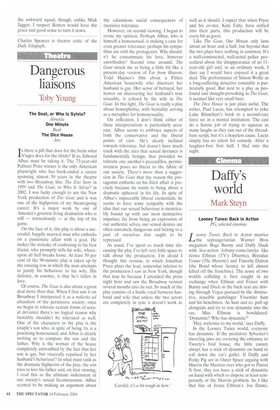Dangerous liaisons
Toby Young
The Goat, or Who Is Sylvia? Almeida One Minute Bush The Dice House Arts
Is there a pill that does for the brain what Viagra does for the libido? If so, Edward Albee must be taking it. The 73-year-old Pulitzer Prize winner is the only American playwright who has book-ended a career spanning almost 50 years in the theatre with two Broadway hits: The Zoo Story in 1959 and The Goat, or Who Is Sylvia? in 2002. I was lucky enough to see the New York production of The Goat and it was one of the highpoints of my theatregoing career. It's a major work by one of America's greatest living dramatists who is
still miraculously — at the top of his game.
On the face of it, this play is about a successful, happily married man who embarks on a passionate affair with a goat. He makes the mistake of confessing to his best friend, who promptly tells his wife, whereupon all hell breaks loose. At least 50 per cent of the 90-minute play is taken up by the ensuing row in which the man attempts to justify his behaviour to his wife. His defence, in essence, is that he's fallen in love.
Of course, The Goat is also about a great deal more than that. When I first saw it on Broadway I interpreted it as a reductio ad absurdum of the permissive society: once we begin to tolerate certain forms of sexual deviance there's no logical reason why bestiality shouldn't be tolerated as well. One of the characters in the play is the couple's son who, in spite of being 16, is a practising homosexual, and Albee is clearly inviting us to compare the son and the father. Why is the woman of the house completely untroubled by the fact that her son is gay, but viscerally repulsed by her husband's behaviour? In what must rank as the dramatic highpoint of the play, the son tries to kiss his father and, on first viewing, I read this as the ultimate indictment of our society's sexual licentiousness. Albee seemed to be making an argument about the calamitous social consequences of excessive tolerance.
However, on second viewing, I began to revise my opinion. Perhaps Albee, who is himself a homosexual, is making a case for even greater tolerance; perhaps his sympathies are with the protagonist. Why shouldn't he consummate his love, however unorthodox? Second time around, The Goat struck me as being a little bit like a present-day version of Far from Heaven, Todd Haynes's film about a Fifties American housewife who discovers her husband is gay. Her sense of betrayal, her horror on discovering her husband's true sexuality, is echoed by the wife in The Goat. In this light, The Goat is really a play about homophobia, with bestiality serving as a metaphor for homosexuality.
On reflection, I don't think either of these interpretations is particularly accurate. Albee seems to embrace aspects of both the conservative and the liberal points of view. He's clearly inclined towards tolerance, but doesn't have much truck with the idea that sexual deviance is fundamentally benign; that provided we tolerate one another's peccadillos, permissiveness poses no threat to the fabric of our society. There's more than a suggestion in The Goat that the reason the protagonist embarks on his illicit affair is precisely because he wants to bring about a dramatic upheaval in his life. In spite of Albee's impeccable liberal credentials, he seems to have some sympathy with the idea that our sexual behaviour is inextricably bound up with our most destructive impulses; far from being an expression of our authentic selves, our sexual desires are often extremely dangerous and belong to a part of ourselves that ought to be repressed.
As usual, I've spent so much time discussing the play I've left very little space to talk about the production. I'm afraid I thought this version, in which Jonathan Pryce plays the lead, somewhat inferior to the production I saw in New York, though that may be because I attended the press night here and saw the Broadway version several months into its run. So much of the play consists of a battle royal between husband and wife that unless the two actors are completely in sync it doesn't work as well as it should. I expect that when Pryce and his co-star, Kate Fahy, have settled into their parts, this production will be every bit as good.
Like The Goat, One Minute only lasts about an hour and a half, but beyond that the two plays have nothing in common. It's a well-constructed, well-acted police procedural about the disappearance of an 11year-old girl and, in an ordinary week, I dare say I would have enjoyed it a great deal. The performance of Simon Wolfe as a long-suffering detective constable is particularly good. But next to a play as profound and thought-provoking as The Goat, it seemed like very small beer.
The Dice House is just plain awful. The writer, Paul Lucas, has attempted to yoke Luke Rhinehart's book to a second-rate farce set in a mental institution. The cast do a heroic job of trying to squeeze as many laughs as they can out of the threadbare script, but it's a hopeless cause. Lucas simply has no talent for comedy. After a laughter-free first half, I fled into the night.


































































 Previous page
Previous page